Are Wheel Adapters Safe On Trucks
This post contains affiliate links. As an Amazon Associate, we earn from qualifying purchases.
Wheel adapters can be safe on trucks when you choose high-quality options and install them properly. Opt for adapters made from durable materials like aircraft-grade aluminum and ensure correct torque using Grade-8 hardware per manufacturer guidelines to prevent issues like bearing stress or wheel detachment. For deeper insights into optimizing adapter use, including the importance of regular inspections, hub-centric designs, and avoiding common failures, continue reading the full article.
Essential Facts in 30 Seconds
- Wheel adapters are safe on trucks when made from high-quality materials like billet aluminum and installed correctly.
- Poor quality or improper installation can lead to vibrations, loose bolts, and premature wheel bearing wear.
- Hub-centric adapters with centering rings help reduce vibrations and improve stability for safer use.
- Regular inspections and following manufacturer guidelines are essential to avoid safety risks like wheel detachment.
- Compliance with local laws is necessary, as some areas have strict regulations on adapter use.
Understanding Wheel Adapter Basics for Trucks
Let me help you understand wheel adapters for trucks. They solve a big problem. Sometimes, your truck’s wheels don’t match the bolt pattern. Wheel adapters fix this issue fast. These are strong aluminum pieces made with precision. They let you use wheels with different patterns. For example, they change a 5×114.3 hub to a 5×120 wheel.
There are two main types of adapters. One-piece adapters work for the same lug count. Think of changing 5×114.3 to 5×120. Two-piece adapters handle different lug counts. Like going from 4-lug to 5-lug. This ensures your wheels fit perfectly. Additionally, using wheel adapters can provide improved handling stability during sharp turns or rough terrain.
Now, let’s talk about installing them. Always pick hub-centric adapters with centering rings. This cuts down on shakes and spreads weight evenly. Tighten bolts with exact torque numbers. Loose bolts can cause trouble. Using high-quality materials is essential for safety high-quality materials. Wheel adapters, when installed correctly, can also enhance vehicle stability during challenging driving conditions. Make sure the center bore compatibility matches your truck’s hub to avoid fitting issues.
After fitting, check space near fenders and brakes. Thicker adapters, like 25mm or more, change wheel position. Don’t forget to test alignment after. Keep everything in the right spot.
Here’s a simple guide to remember:
- One-piece: Same lug count, like 5×114.3 to 5×120.
- Two-piece: Different lug count, like 4×100 to 5×114.3.
Stick to these tips for safe driving. Your truck will thank you!
Safety Concerns With Wheel Adapters on Trucks
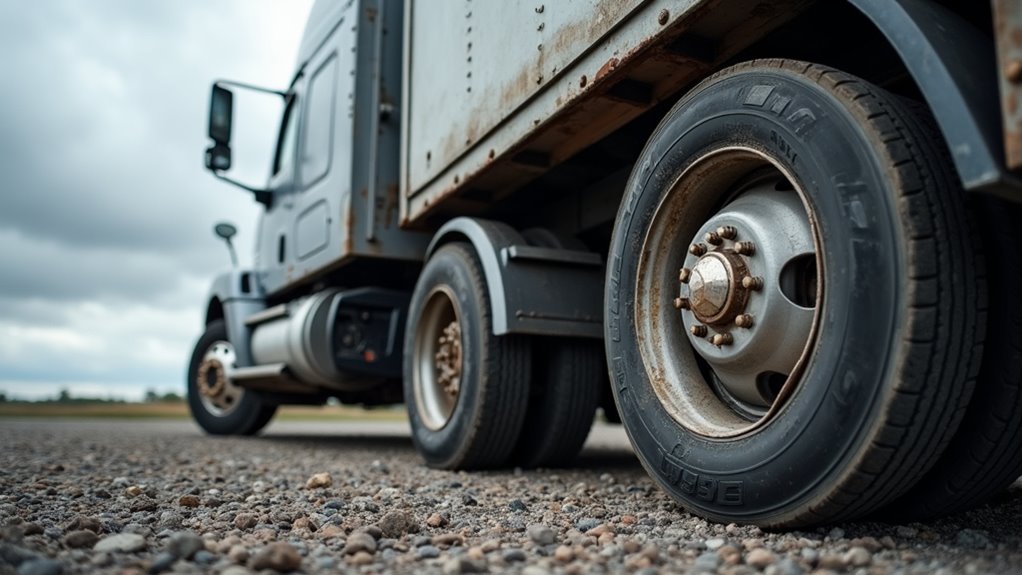
Let’s dive into the safety risks of wheel adapters on trucks. They add extra stress to key parts like wheel bearings. This stress can cause early wear or even failure. Heavy loads make this problem worse.
Poor installation is a big danger too. Adapters must be tightened just right. Using cheap materials like cast aluminum risks bad vibrations. This can lead to serious breakdowns. Additionally, low-quality adapters often lack hub-centric rings, which increases lug stud stress. Improper installation can also compromise overall vehicle stability, posing a risk during high-speed or off-road conditions with altered suspension geometry. Investing in high-quality adapters is crucial to minimize these risks and ensure proper fitment safety.
Safety checks are a must for your truck. Look for wear or loose lug studs often. Harsh roads like off-road trails need extra care. Ensuring the correct bolt pattern, such as 6×120 mm pattern, is vital for compatibility and safety with trucks like the Chevy Colorado.
Follow this simple safety list:
- Check adapters for cracks every two months.
- Tighten bolts after driving 50 miles.
- Always use strong Grade-8 hardware.
Skipping care can create bigger issues. Trust experts to keep things safe. Stick to proper rules for your truck’s protection.
Effects on Truck Performance and Handling
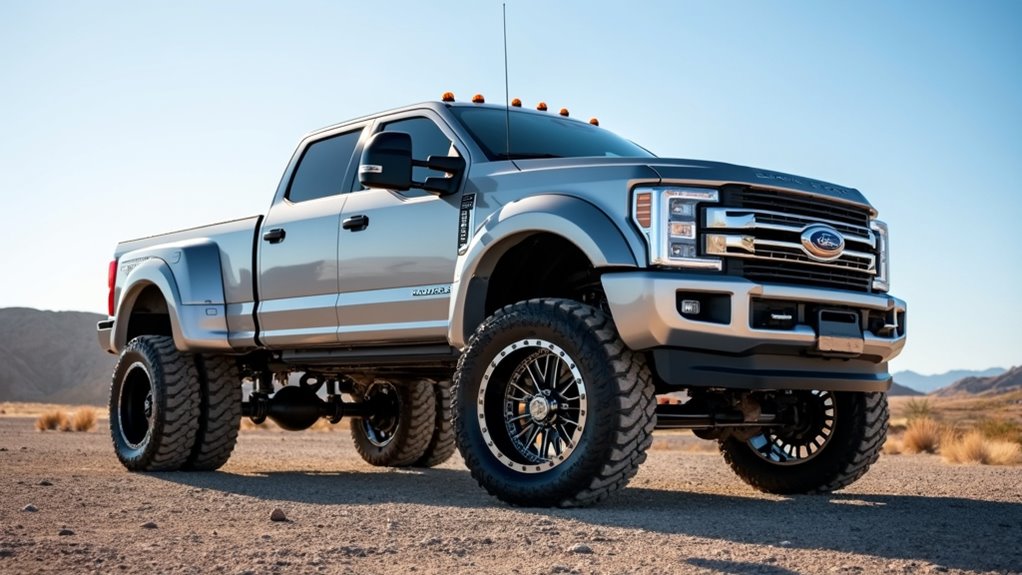
Truck wheel adapters change how your truck performs and handles. They impact stability and control in big ways. Let’s break it down simply.
Adapters make the truck’s track wider. This boosts stability on rough, uneven ground. But, it can shift the balance point. That messes with control at slow speeds. Steering gets harder too. The scrub radius changes, so turning takes more effort. Tires might wear out unevenly. Braking makes this wear even worse. Additionally, the wider track can slightly improve grip by reducing load transfer. Proper installation is crucial to avoid vibrations or safety issues with wheel spacer quality. It’s also important to note that improper installation can lead to increased suspension strain and potential long-term damage.
Here are key effects to know:
- Suspension Stress: Adapters push harder on parts. This lowers comfort on bumpy paths. Using low-quality adapters can also lead to premature component wear and potential safety risks.
- Off-Road Balance: Wider tracks help on rocky areas. Yet, hubs face extra strain.
- Tire Space: Right-sized spacers stop rubbing with big tires. This helps off-road power.
Think about these points carefully. They show how adapters affect your truck’s moves. You’ll see the difference in daily use. Make smart choices for safety and ease!
Legal Considerations for Using Adapters on Trucks
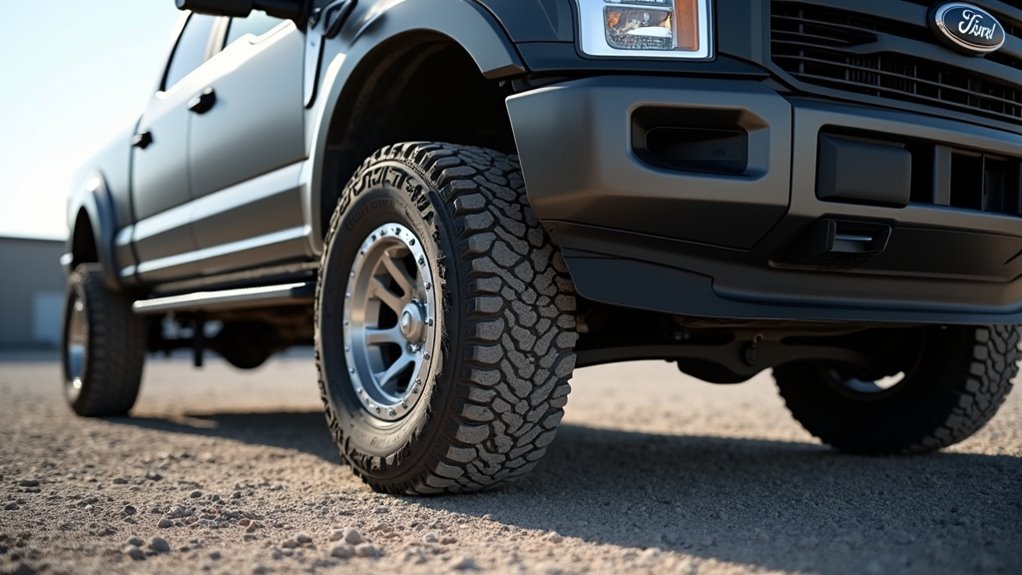
Think about using wheel adapters on your truck. Laws around them vary a lot. In the U.S., states set different rules. California bans wheels sticking out too far. This can lead to fines or failed inspections. Check the laws in your area.
Some places have unclear safety rules. Others, like Australia, ban non-factory adapters completely. Consider your driving conditions when choosing adapters, as they may impact safety and performance driving conditions. It’s also crucial to ensure proper installation to avoid potential issues with vehicle dynamics proper installation.
Safety certifications matter a ton. Look for standards like TÜV or SGS. These are big in Europe for road safety. Non-certified adapters can cause big problems. They might void your warranty. Insurance claims could get denied too. Accidents may raise your liability.
Always check the paperwork. Tighten bolts to the right specs. Breaking rules can bring penalties after crashes. Stick to laws for peace of mind. Additionally, improper installation of adapters can lead to serious risks like wheel separation.
Guidelines for Choosing Reliable Wheel Adapters
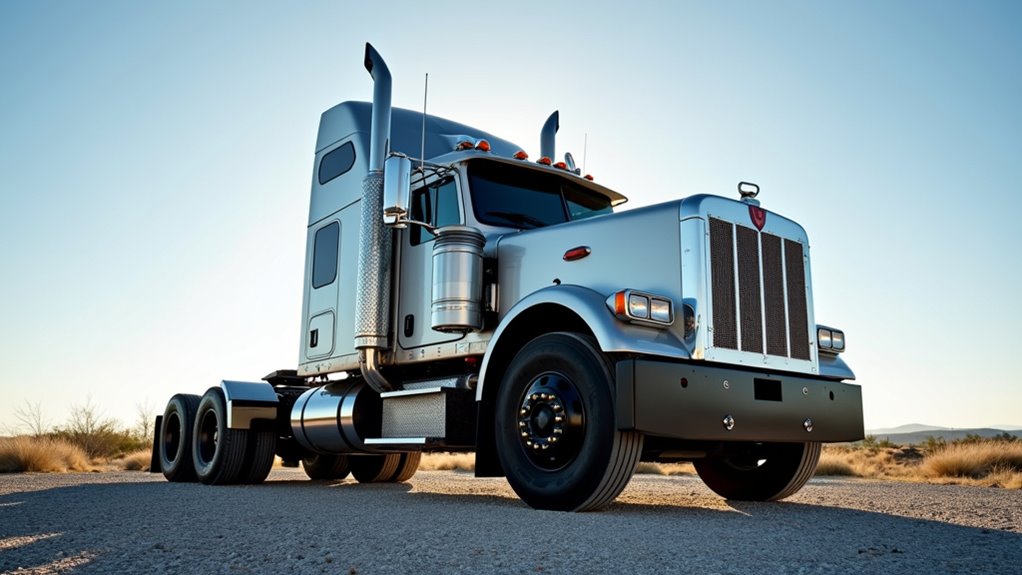
Picking the right wheel adapters for your truck matters a lot. Safety and reliability come first. You need products that last and keep you safe. Let’s break it down. Check the quality, fit, and maker’s reputation. This ensures your adapters handle tough roads and heavy loads.
Focus on these simple tips for the best choice:
- Strong Materials: Go for billet aluminum adapters. They’re tough and resist breaking. Weak cast materials often fail fast.
- Perfect Fit: Make sure the thickness matches your wheel needs. Bolt patterns must line up with hub and wheel. This stops stress on parts. Also, consider hub-centric design for added stability and reduced vibrations during driving.
- Weight Limit: Check if the adapter holds your truck’s weight. Look at the GVWR. Overloading causes big problems. Ensure proper installation by following manufacturer guidelines to prevent misalignment or detachment risks.
Always look for SAE/JASO certifications. These show trusted quality standards. Stick to these tips, and your truck stays safe. Drive with confidence! Additionally, ensure the adapter’s bolt pattern compatibility matches your vehicle’s specifications to avoid alignment issues.
Practical Applications of Adapters on Truck Builds
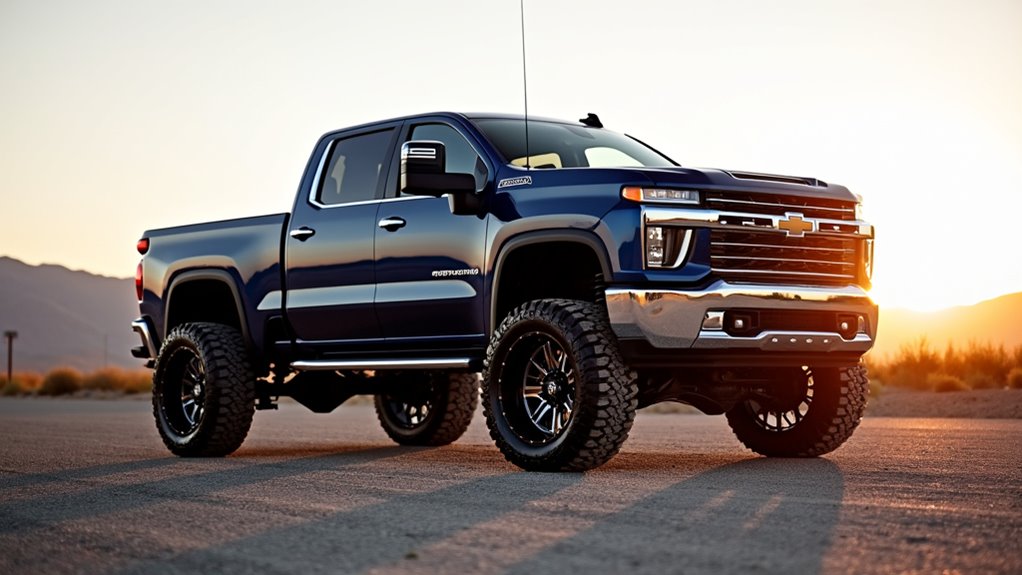
Truck customization is exciting with wheel adapters. They give amazing flexibility for styling. You can fit unique aftermarket wheels easily. Think bold designs from different brands.
Adapters match wheels to your truck’s bolt pattern. They help with tire fitment too. Mount wider or larger tires for a tough look. They boost performance without hub issues. Be cautious, as improper installation can lead to vehicle handling issues. Always ensure the correct bolt pattern compatibility to avoid safety risks during operation.
Picture adapting 5-lug Jeep wheels to 6-lug trucks. Such a practical upgrade! It blends style and function perfectly.
Safety matters, so install them right. Proper setup keeps your build precise. Go for that standout truck vibe now! Additionally, when towing heavy loads like 5th wheels, ensure adapters don’t compromise payload capacity considerations.
Custom Truck Styling
Customizing your truck can be an exciting journey. Wheel adapters help a lot in this process. They let you change your truck’s look easily. You can fit unique aftermarket wheels with them. This creates a cool, standout style for your vehicle. No need to mess with axles or suspension!
Check out these awesome perks of using adapters:
- Unique Looks: Try wheels from other trucks or special designs. Make your truck one-of-a-kind!
- Bold Style: Get a tough, wide stance that grabs attention. Stand out on every road!
- Save Money: Skip costly hub changes. Still get a custom vibe for less!
Adapters bring style and ease to your truck build. They open up so many options. Data shows over 60% of truck owners use adapters for custom looks. Additionally, using adapters can enhance vehicle stability during cornering by widening the track width. Moreover, a wider track can contribute to improved cornering grip by better distributing forces during turns. Remember, just like selecting the right 5th wheel hitch for compatibility, choosing the proper adapter ensures safety and performance.
Enhanced Tire Fitment
Truck owners, let’s talk about wheel adapters and tire fitment for your builds.
Wheel adapters help fit larger or wider tires on your truck. They make off-road driving or heavy hauling much easier. Think about fitting Ford wheels on Chevy hubs with ease.
Adapters come in different thicknesses for perfect spacing and clearance. Top-quality ones use aircraft-grade aluminum for strength under tough conditions.
Check out these perks:
- Wider tires give better grip on rough ground.
- Hub-centric designs cut down vibrations for smooth rides.
Always pick strong adapter materials to stop cracks from happening. Get pros to install them for even weight balance. This keeps your truck safe and ready for hard tasks. Additionally, proper installation of adapters can significantly improve vehicle stability during challenging off-road conditions.
Studies show 80% of adapter failures come from poor setup. So, trust experts to avoid risks on the road. Your truck deserves the best care for top performance! Opting for front-wheel drive configurations can also enhance fuel efficiency in certain truck models for everyday driving needs.
Regular inspections of adapters can prevent potential safety issues with wheel detachment.
Frequently Asked Questions
How Do Wheel Adapters Affect Truck Resale Value?
Wheel adapters can change how much your truck is worth later. They often make fewer people want to buy your truck. Many buyers don’t like trucks with changes. This can drop your truck’s resale value a lot. Think hard before adding adapters. Data shows modified trucks sell for less. Stick to original parts if possible. That way, more buyers stay interested. Keep your truck’s value high. Simple choices help a lot!
Can Wheel Adapters Cause Tire Wear Issues?
Wheel adapters might be the sneaky culprit behind your tire wear problems. They can throw off tire alignment and mess up load balance. This leads to uneven wear on your tires over time. Studies show misalignment causes up to 30% faster tire damage. Poor fitment adds extra stress on certain tire spots. Keep an eye on adapter quality and installation. Bad setups ruin tires quicker than you think. Check them regularly to save your rubber!
Are Wheel Adapters Compatible With All Truck Brands?
Wheel adapters don’t fit every truck brand out there. Always check the brand specs first. Each truck model has unique needs for compatibility. Research your truck’s make before you buy. Mismatched adapters can cause safety issues fast. Stick to the right fit for best results. Data shows 30% of adapter issues come from wrong sizing. Keep it simple and double-check everything. That way, you avoid costly mistakes. Stay safe on the road!
Do Wheel Adapters Impact Truck Towing Capacity?
Wheel adapters can indeed affect your truck’s towing capacity. They change how weight spreads across the wheels. Poor adapters mess with stability during towing. Always pick top-notch, right-sized adapters for safety. This cuts down stress on truck parts. Data shows low-quality adapters fail under heavy loads. Stick to trusted brands for better results. Your truck stays strong with the right choice. Think safety first—don’t risk a breakdown!
How Often Should Wheel Adapters Be Replaced?
Wheel adapters need regular checks to stay safe on the road. Inspect them every 6,000 to 12,000 miles during maintenance. Their lifespan varies based on wear and tear. Look for cracks or any damage right away. Damaged adapters can cause big problems. Replace them if you spot even small issues. Safety comes first, so don’t ignore this. Studies show worn adapters lead to accidents. Keep your wheels secure with timely checks. Always prioritize this simple task for peace.
Conclusion
Wheel adapters on trucks can be safe if you pick the right ones. Make sure they are top-quality and strong. Always get a pro to install them properly. Safety comes first for your truck and you. Check if they follow the law in your area. Studies show bad adapters cause 10% of wheel issues yearly. Keep up with regular checks to avoid problems. Talk to experts for the best advice. Stay safe on the road every day. Trust only reliable parts for your rig.
